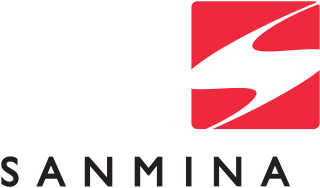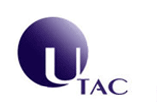National Semiconductor Corporation was an American semiconductor manufacturer, which specialized in analog devices and subsystems, formerly headquartered in Santa Clara, California. The company produced power management integrated circuits, display drivers, audio and operational amplifiers, communication interface products and data conversion solutions. National's key markets included wireless handsets, displays and a variety of broad electronics markets, including medical, automotive, industrial and test and measurement applications.

Fairchild Semiconductor International, Inc. was an American semiconductor company based in San Jose, California. It was founded in 1957 as a division of Fairchild Camera and Instrument by the "traitorous eight" who defected from Shockley Semiconductor Laboratory. It became a pioneer in the manufacturing of transistors and of integrated circuits. Schlumberger bought the firm in 1979 and sold it to National Semiconductor in 1987; Fairchild was spun off as an independent company again in 1997. In September 2016, Fairchild was acquired by ON Semiconductor.
Renesas Electronics Corporation is a Japanese semiconductor manufacturer headquartered in Tokyo, Japan, initially incorporated in 2002 as Renesas Technology, the consolidated entity of the semiconductor units of Hitachi and Mitsubishi excluding their dynamic random-access memory (DRAM) businesses, to which NEC Electronics merged in 2010, resulting in a minor change in the corporate name and logo to as it is now.

Cypress Semiconductor Corporation was an American semiconductor design and manufacturing company. It offered NOR flash memories, F-RAM and SRAM Traveo microcontrollers, PSoCs, PMICs, capacitive touch-sensing controllers, Wireless BLE Bluetooth Low-Energy and USB connectivity solutions.

Analog Devices, Inc. (ADI), also known simply as Analog, is an American multinational semiconductor company specializing in data conversion, signal processing, and power management technology, headquartered in Wilmington, Massachusetts.
Lattice Semiconductor Corporation is an American semiconductor company specializing in the design and manufacturing of low power field-programmable gate arrays (FPGAs). Headquartered in the Silicon Forest area of Hillsboro, Oregon, the company also has operations in San Jose, Calif., Shanghai, Manila, Penang, and Singapore. Lattice Semiconductor has more than 1000 employees and an annual revenue of more than $660 million as of 2022. The company was founded in 1983 and went public in 1989. It is traded on the Nasdaq stock exchange under the symbol LSCC.
Teradyne, Inc. is an American automatic test equipment (ATE) designer and manufacturer based in North Reading, Massachusetts. Its high-profile customers include Samsung, Qualcomm, Intel, Analog Devices, Texas Instruments and IBM.
Credence Systems Corporation was a manufacturer of test equipment for the global semiconductor industry, with a major focus on solving specific challenges facing the fast-growing consumer-driven semiconductor markets. It was headquartered in Milpitas, California and merged with LTX in 2008.

Sanmina Corporation is an American electronics manufacturing services (EMS) provider headquartered in San Jose, California that serves original equipment manufacturers in communications and computer hardware fields. The firm has nearly 80 manufacturing sites, and is one of the world’s largest independent manufacturers of printed circuit boards and backplanes. As of 2022, it is ranked number 482 in the Fortune 500 list.
Microchip Technology Incorporated is a publicly listed American corporation that manufactures microcontroller, mixed-signal, analog, and Flash-IP integrated circuits. Its products include microcontrollers, Serial EEPROM devices, Serial SRAM devices, embedded security devices, radio frequency (RF) devices, thermal, power, and battery management analog devices, as well as linear, interface and wireless products.

Nicholas DeWolf was co-founder of Teradyne, a Boston, Massachusetts-based manufacturer of automatic test equipment. He founded the company in 1960 with Alex d'Arbeloff, a classmate at MIT.

Verigy Ltd was a Cupertino, California-based semiconductor automatic test equipment manufacturer. The company existed as a business within Hewlett-Packard before it was spun off in 2006 as a standalone company. It was purchased by Advantest in 2011.

NXP Semiconductors N.V. is a Dutch semiconductor manufacturing and design company with headquarters in Eindhoven, Netherlands. It is the third largest European semiconductor company by market capitalization as of 2024. The company employs approximately 34,000 people in more than 30 countries and it reported revenues of $13.3 billion in 2023. The company's origins date back to the 1950s as part of Philips and it became one of the world's largest semiconductor company by the end of the 20th century. Philips spun off the company in 2006 and it has since operated independently.

Broadcom Inc. is an American multinational designer, developer, manufacturer, and global supplier of a wide range of semiconductor and infrastructure software products. Broadcom's product offerings serve the data center, networking, software, broadband, wireless, storage, and industrial markets. As of 2024, some 58 percent of Broadcom's revenue came from its semiconductor-based products and 42 percent from its infrastructure software products and services.

United Test and Assembly Center Ltd is one of the largest providers of test and assembly services for a wide range of semiconductor devices, including memory, mixed-signal/RF and logic integrated circuits. Founded in 1997 by Inderjit Singh and commencing full operations in 1999, the company started out by acquiring the semiconductor test operations of Fujitsu Microelectronics Asia Pte. Ltd.

Cadence Design Systems, Inc. is an American multinational technology and computational software company. Headquartered in San Jose, California, Cadence was formed in 1988 through the merger of SDA Systems and ECAD. Initially specialized in electronic design automation (EDA) software for the semiconductor industry, currently the company makes software and hardware for designing products such as integrated circuits, systems on chips (SoCs), printed circuit boards, and pharmaceutical drugs, also licensing intellectual property for the electronics, aerospace, defense and automotive industries, among others.
Eagle Test Systems is a supplier of automatic test equipment (ATE) and operates as a business unit within the Teradyne Semiconductor Test Division. Eagle's test equipment was designed to address volume production. Customers, including semiconductor manufacturers and assembly and test subcontractors, use the products to test analog, a combination of digital and analog, known as mixed-signal, and radio frequency (RF) semiconductors.

Francisco Partners Management, L.P., doing business as Francisco Partners, is an American private equity firm focused exclusively on investments in technology and technology-enabled services businesses. It was founded in August 1999 and based in San Francisco with offices in London and New York City.
Silicon Systems Inc. (SSi) was an American semiconductor company based in Tustin, California. The company manufactured mixed-signal integrated circuits and semiconductors for telecommunications and data storage.

LSI Logic Corporation, was an American company founded in Santa Clara, California, was a pioneer in the ASIC and EDA industries. It evolved over time to design and sell semiconductors and software that accelerated storage and networking in data centers, mobile networks and client computing.











